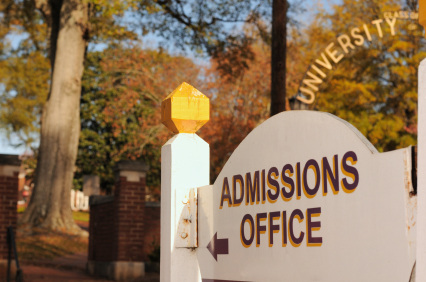
straight from the gatekeeper...
Recently, I met with the Director of Admissions at a local private university, known for its liberal arts program and gorgeous campus. She gave me insight into what an admissions counselor is looking for in prospective students, as well as an alternative way to thinking about school acceptance rates. It turns out, schools aren't necessarily looking for the "well-rounded" student, and you, in turn, may not want to attend the school with the 14% acceptance rate.
IT'S not about the longest resume
I asked: "As an Admissions Counselor, would you rather see a student who is well-rounded, in the sense that he plays a varsity sport, is a leader in a bunch of clubs, studies German, and is a proficient violinist - OR - would you prefer to see a student choose one activity, like art, and pursue it consistently over several years?"
She replied that it depends. Of course they want to see students doing both - demonstrating commitment to a certain passion, while participating in the full scope of extracurricular activities offered to high school students.
Ultimately, however, she emphasized accepting an applicant comes down to if the student is prepared to succeed at her school. Does the student's grades, test scores, letters of recommendation, and essay provide a composite sketch of the applicant's preparedness, including emotional maturity, to be successful at the university-level?
She replied that it depends. Of course they want to see students doing both - demonstrating commitment to a certain passion, while participating in the full scope of extracurricular activities offered to high school students.
Ultimately, however, she emphasized accepting an applicant comes down to if the student is prepared to succeed at her school. Does the student's grades, test scores, letters of recommendation, and essay provide a composite sketch of the applicant's preparedness, including emotional maturity, to be successful at the university-level?
reconsider how you look at acceptance rates
Similarly, she suggested reframing how you approach acceptance rates when weighing the relative value of a particular school. They accept 80+% regularly because 80% of the applicants were prepared to be successful and the school had the capacity to accommodate all who qualified.
Think about it: if a school is turning down qualified applicants left and right, you are about to enter a VERY competitive atmosphere. If you thrive on perceived competition, you stand to do well in this environment.
However, if you are someone who doesn't want to feel like you have something to prove from Day One, you might be more comfortable at a college with a higher acceptance rate.
Think about it: if a school is turning down qualified applicants left and right, you are about to enter a VERY competitive atmosphere. If you thrive on perceived competition, you stand to do well in this environment.
However, if you are someone who doesn't want to feel like you have something to prove from Day One, you might be more comfortable at a college with a higher acceptance rate.
visit prospective schools before applying
Sometimes you can just feel if a school is right - or completely wrong - by walking on campus. It's absolutely worth the time and money to arrange a meeting with an admissions representative to hear about what the school has to offer you. Yes, you are trying to impress them, but remember - they are also concerned with winning great students to attend their school.
You can do campus tours, meetings with financial aid representatives, and even set up an overnight visit with current students. I remember doing a visit at Colgate University. The sophomore assigned to babysit me was fantastic, and her enthusiasm for the school was evident. Heck, I loved Colgate! But I did not love its location in rural upstate New York; something about the campus felt too isolated for me. And I never would have known if I hadn't been there in person.
You can do campus tours, meetings with financial aid representatives, and even set up an overnight visit with current students. I remember doing a visit at Colgate University. The sophomore assigned to babysit me was fantastic, and her enthusiasm for the school was evident. Heck, I loved Colgate! But I did not love its location in rural upstate New York; something about the campus felt too isolated for me. And I never would have known if I hadn't been there in person.
It's no wizard of oz
Admissions representatives are real people who are dedicated to initiating and building relationships with prospective students and their families. They want applicants who demonstrate a readiness to succeed in particular university environments, and are a resource for those students who are undecided whether or not they should apply.
And admissions counselors, like other educators, derive enormous satisfaction from playing a role in helping further a student's academic and professional goals.
And admissions counselors, like other educators, derive enormous satisfaction from playing a role in helping further a student's academic and professional goals.

